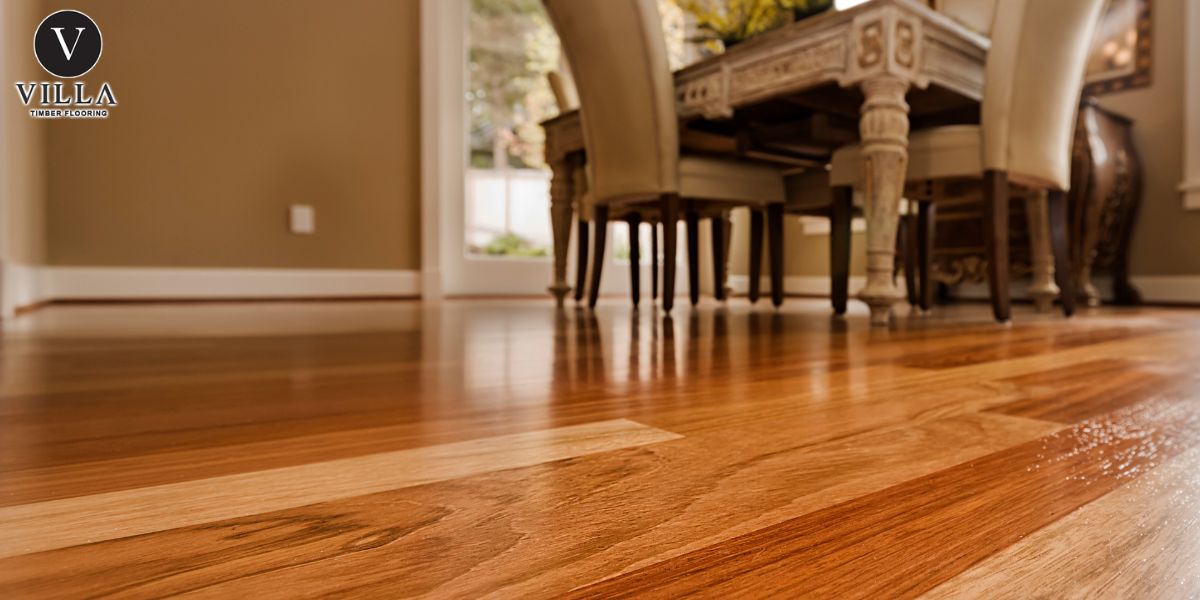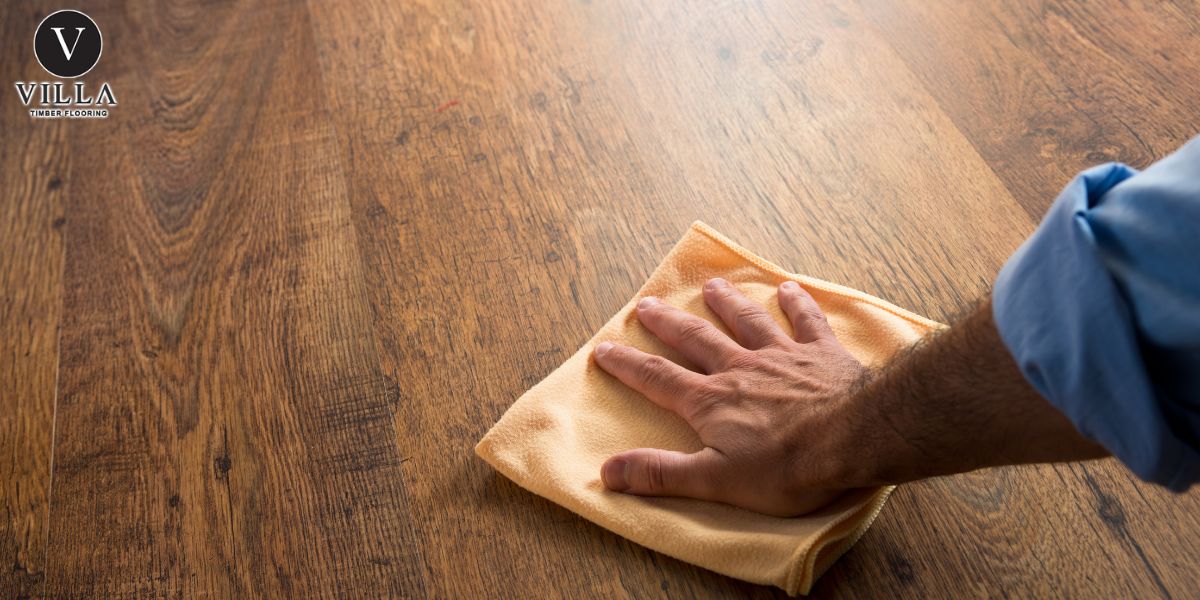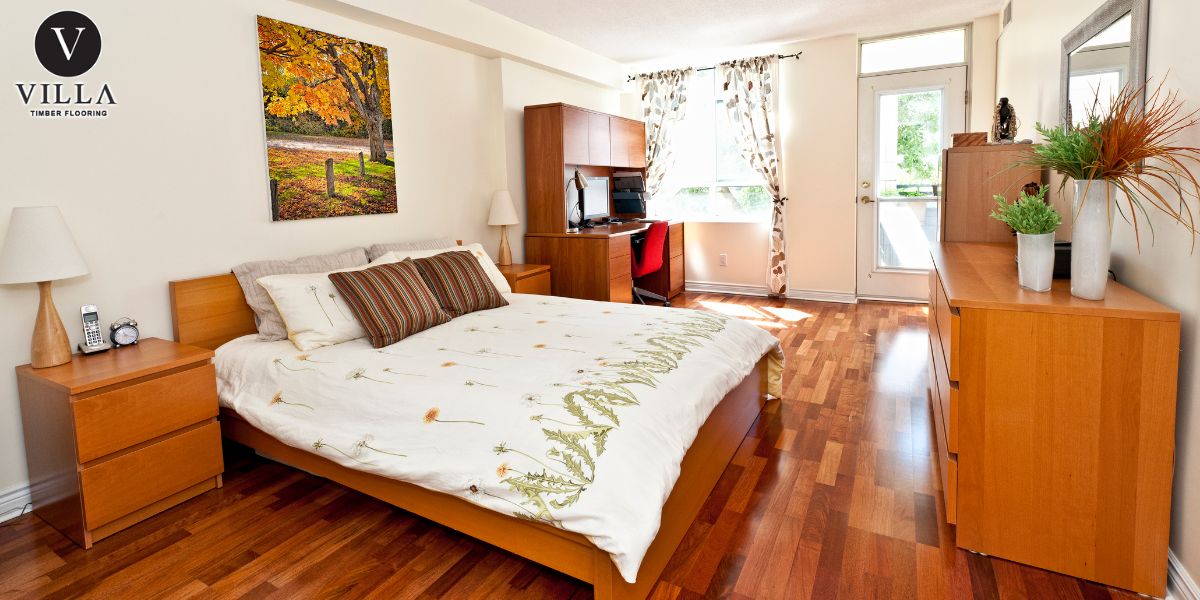Engineered Wood vs Solid Wood - Which is Better?
Monday, 24/06/2024
Administrator
831
24/06/2024, Administrator
831
Choosing flooring material is an essential aspect of interior design and home construction. Although hardwood and engineered wood flooring may look similar, they differ in every aspect, including cost, maintenance, durability, and installation. Timber Villa will provide information about these two types of flooring in the following article.
1. Differences Between Engineered Wood Flooring and Hardwood Flooring
Engineered Wood Flooring
Engineered wood flooring is a synthetic floor covering made of fiberboard, a printed image layer that simulates wood, and a sturdy transparent wear layer. Engineered wood planks range in thickness from 6 mm to 12 mm. The planks are manufactured with interlocking edges, eliminating the need for nails or glue during installation.
Hardwood Flooring
Hardwood flooring is a natural flooring material made from softwoods like pine or hardwoods like oak. Hardwood flooring can be pre-finished at the factory or finished on-site by the installer with stain and a protective coating. Hardwood flooring must be nailed to the subfloor. The cost of natural hardwood flooring is considerably higher than engineered wood due to the decreasing availability of raw materials and its many superior advantages.

2. Which Flooring is Better?
Hardwood flooring excels in appearance, durability, and resale value. In contrast, engineered wood flooring is more cost-effective, easier to install, and comfortable. However, hardwood flooring is often rated higher than engineered wood because it is not just a surface covering but a complete flooring material, providing premium beauty and quality to living spaces.
3. Appearance and Aesthetic Beauty
Engineered Wood Flooring
Engineered wood flooring can look identical to real hardwood from a distance, thanks to sharp graphics and embossed surfaces, resulting in uniform color and wood grain. Although some engineered wood types now mimic natural wood grain, repetitive patterns are inevitable. The smooth surface of engineered wood is comfortable to walk on due to the soft foam underlay.
Hardwood Flooring
Hardwood flooring is, of course, real wood. When installed, natural hardwood flooring offers a color range with relative uniformity from 70% to 90%, and the wood grain is unique and varied, providing visual interest. The diversity of natural hardwood planks is due to the different wood types, origins, and individual trees, creating a distinctive, nature-inspired appeal. The hardwood surface feels smooth underfoot but is hard, making area rugs and carpets a good idea for added comfort.

4. Durability
Engineered Wood Flooring
Engineered wood flooring has a shorter lifespan because it is bonded with adhesives that lose effectiveness over time. The average lifespan of engineered wood flooring is estimated to be around 15 to 25 years with proper maintenance. Once the adhesive fails, the flooring peels and crumbles, making replacement inevitable.
Hardwood Flooring
Natural hardwood flooring can last several decades to hundreds of years with proper maintenance. It is incredibly sturdy, having been cut from trees that have grown for decades, providing excellent resistance to termites and moisture. The surface is also coated with scratch-resistant finishes.
5. Water, Temperature and Environment
Engineered Wood Flooring
Manufacturers rate engineered wood flooring as water-resistant as long as the joints are sealed and water is quickly removed. It is not recommended for high-humidity areas like bathrooms. After installation, engineered wood flooring may continue to emit harmful chemicals, affecting the air quality and posing health risks to users.
Hardwood Flooring
Hardwood flooring is not recommended for high-moisture areas or basement installations. It can be installed over radiant heating systems, but long-term heat exposure can be detrimental, causing the wood to crack and joints to separate. Natural hardwood planks are 100% organic, free of additives or harmful chemicals, making them safe for health.

6. Maintenance and Care
Engineered Wood Flooring
Due to factors such as water absorption or termites, engineered wood flooring often peels after a few years and cannot be repaired, necessitating replacement. It is crucial to keep engineered wood dry and avoid standing water. Cleaning should be done with a soft broom, a dry mop, or a slightly damp mop. Damaged engineered wood cannot be polished; the damaged planks must be removed and replaced to maintain the floor’s aesthetic.
Hardwood Flooring
Natural hardwood resists moisture and termites well, preventing peeling. Keeping hardwood dry is essential. Cleaning should be limited to dry or slightly damp mops. Damaged hardwood can be sanded and polished. Additionally, if the surface gets scratched over time, it can be sanded and refinished to look new again.
Timber Villa provides this information about engineered wood and hardwood flooring. Timber Villa is a reputable company of flooring materials with competitive prices. Our professional, dedicated, and meticulous team ensures customer satisfaction. Timber Villa has experience in various projects, including business offices, hotels, restaurants, cafes, apartments, hospitals, and shopping centers. If you need fast, quality, and affordable wood flooring installation, contact Timber Villa for the most professional service.
VILLA TIMBER FLOORING & RENOVATION PTY LTD (AUSTRALIA)
Tel: (03) 9191 9898
Mobile: 0434 331 642 (Quang) - 0422 879 868 (Vinh Pham)
Email: inquiry@timbervilla.au
Address: 298 Canterbury Road, Surrey Hills, VIC 3127
VILA WOODEN FURNITURE JOINT STOCK COMPANY (VIET NAM)
Address: 133 Nguyen Nhan, Hoa Tho Dong Ward, Cam Le District, Da Nang City, Vietnam
Hotline: 0905 612 637
Tax: 0401929279
Email: inquiry@timbervilla.au
-
 What is Thermally Modified Wood Flooring? Advantages and Disadvantages09/11/2024
What is Thermally Modified Wood Flooring? Advantages and Disadvantages09/11/2024 -
 Use the correct rubber underlay for your wood floor installations09/11/2024
Use the correct rubber underlay for your wood floor installations09/11/2024 -
 Cost To Install Wood Flooring09/11/2024
Cost To Install Wood Flooring09/11/2024 -
 5 Simple Steps to Install Herringbone Wood Flooring09/11/2024
5 Simple Steps to Install Herringbone Wood Flooring09/11/2024 -
 Kaindl Imported Wood Flooring – A Premium Choice for Your Home05/11/2024
Kaindl Imported Wood Flooring – A Premium Choice for Your Home05/11/2024 -
 Choosing the best Malaysian wood flooring for your home05/11/2024
Choosing the best Malaysian wood flooring for your home05/11/2024 -
 How to Choose Bedroom Flooring05/11/2024
How to Choose Bedroom Flooring05/11/2024 -
 Exploring Premium Black Core Wood Flooring05/11/2024
Exploring Premium Black Core Wood Flooring05/11/2024 -
 Exploring Patterned Wood Flooring29/10/2024
Exploring Patterned Wood Flooring29/10/2024 -
 Comparison of Black Core and Green Core Industrial Wood Flooring29/10/2024
Comparison of Black Core and Green Core Industrial Wood Flooring29/10/2024




















